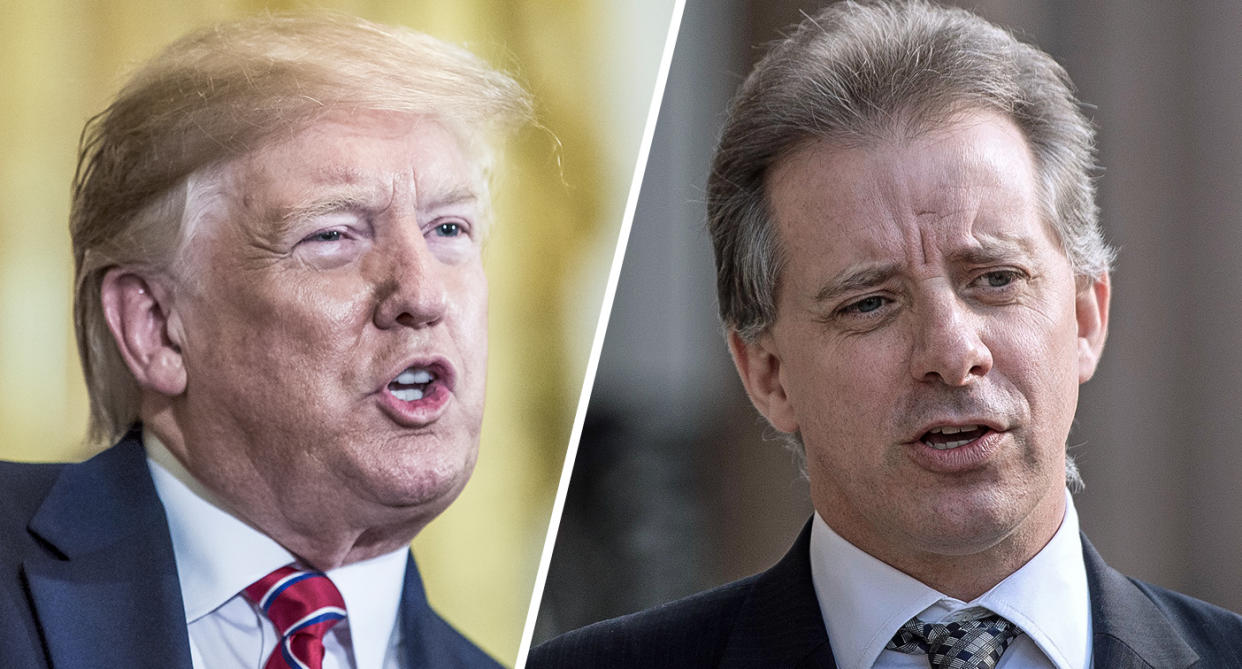Why the Steele dossier is a red herring in the response to Trump's 'oppo research' comments

President Trump's stunning admission that he would accept damaging information about his political rivals from foreign governments without necessarily alerting the FBI left his Republican allies in Congress on Thursday scrambling to come up with a defense. And they quickly pivoted to one: the Steele dossier, the opposition-research document prepared by former British intelligence officer Christopher Steele that, along with other information, was a basis for the FBI’s investigation of the Trump campaign in 2016.
The dossier contained details of Russia’s contacts with Trump associates, some of which have been verified, along with unproven allegations about Trump’s behavior in Russia.
But there are key differences between the infamous dossier and the hypothetical situation Trump was asked about by ABC's George Stephanopoulos.
For one, Steele was working for a U.S. company and not a foreign government. During the 2016 presidential primary, Fusion GPS, a Washington, D.C.-based research firm, was hired by the conservative outlet Washington Free Beacon to do opposition research on Trump on behalf of a Republican opposed to the businessman’s candidacy. When the Beacon pulled out of the deal, Fusion approached Perkins Coie, a law firm representing the Democratic National Committee and Hillary Clinton’s campaign, and asked if it would like to fund it. In April 2016, the firm agreed and Fusion continued its work, hiring Steele to investigate potential ties between Trump and the Russian government.
For another thing, the Steele dossier was not meant to be made public. According to the Washington Post, the FBI — which had previously hired Steele to research corruption in professional soccer — had reached an agreement shortly before the election to pay him to continue his work on Trump. But the bureau ultimately did not pay Steele, and the dossier leaked online shortly before Trump’s inauguration.
Trump and his allies have pointed to it as evidence of surveillance abuses.
“My Campaign for President was conclusively spied on,” Trump tweeted last month. “Nothing like this has ever happened in American Politics. A really bad situation. TREASON means long jail sentences, and this was TREASON!”
After the 2016 election, the dossier was obtained by Sen. John McCain, who was advised by Sen. Lindsey Graham to turn it over to the FBI.
In their Oval Office interview Wednesday, Stephanopoulos asked Trump what he would do if foreign governments offered him damaging information in the upcoming presidential race.
“They have information — I think I’d take it,” Trump said. “If I thought there was something wrong, I’d go maybe to the FBI.”
On Thursday, Graham said it was a “mistake” for Trump to say he'd consider accepting foreign dirt.
“If a foreign government comes to you as a public official and offers to help your campaign, giving you anything of value, be it money or information on your opponent, the right answer is no,” Graham said, before pivoting to the Steele dossier.
"I'm hoping some of my Democratic colleagues will take more seriously the fact that Christopher Steele was a foreign agent paid by the Democratic Party to gather dirt on Trump," he added.
Steele, who had been a Russia expert for Britain's MI6, was hired by Fusion as a private contractor, and at the time was not a "foreign agent." His payment was a campaign expenditure, not a campaign contribution, and was therefore legal.
While Graham and other Republicans, including House Minority Leader Kevin McCarthy, invoked the dossier to defend Trump, one of the president’s most visible defenders on cable television was surprisingly critical.
“You don’t want a foreign government or foreign entity giving you information, because they will want something back,” Brian Kilmeade said on “Fox & Friends” Thursday morning. “If anybody knows that, it is the president. There is no free lunch. If someone wants information, they want influence. I think the president’s got to clarify that.”
_____
Read more from Yahoo News:



